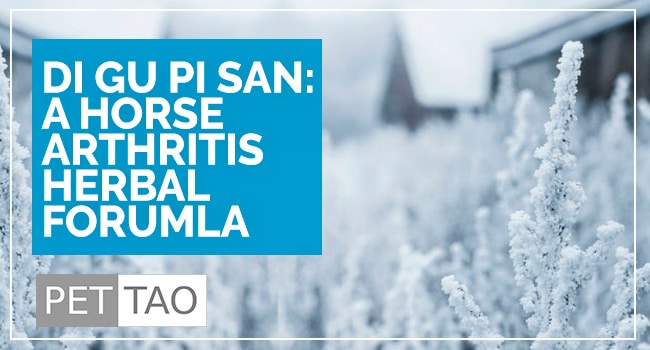It is a painful and debilitating disease, making it difficult for horses to move about.
Equine arthritis begins slowly and develops as the joint surface (cartilage) wears down.
Then, the resulting pain manifests as lameness.
Signs of horse arthritis are:
- Stiffness that dissipates as the horse warms up
- Swelling of the fetlocks, knees, and hocks
- Lameness
Fortunately, TCVM (Traditional Chinese Veterinary Medicine) offers an ancient Chinese herbal formula to ease equine arthritis.
Di Gu Pi San: Western Medicine Applications
Di Gu Pi San is a TCVM blend of 12 different herbs.
Even though Di Gu Pi San is an Eastern herbal blend, it still helps symptoms of some Western diagnoses.
Di Gu Pi San helps horses with the following:
- Equine Arthritis
- Chronic joint pain
- Degenerative joint disease
- Hip dysplasia
- Intervertebral disc disease
- Rheumatism
Di Gu Pi San as Equine Arthritis Remedy
Eastern medicine treats a disease’s root cause(s) rather than symptoms.
Accordingly, TCVM veterinarians use a different evaluation process than Western veterinarians.
Therefore, TCVM vets look for signs of imbalance.
Di Gu Pi San helps horses with the following TCVM signs:
- Chronic bony bi-syndrome due to Kidney Yin and Qi Deficiency
- Dry skin and hair coat
- Preference to cold
- Red, dry tongue
- Stiffness that worsens with heat conditions
- Thready, weak pulse
How Di Gu Pi San Treats Equine Arthritis
Di Gu Pi San is a Traditional Chinese Veterinary Medicine blend of 12 different Eastern herbs.
The herbs perform synergistically, balancing systems and meridians in the body.
Di Gu Pi San addresses the underlying causes of your horse’s illness or disease.
The underlying cause of any disease is an imbalance.
Accordingly, Di Gu Pi San alleviates your horse’s imbalances and soothes the painful symptoms of illness and disease.
According to Traditional Chinese Medicine, Di Gu Pi San heals by:
- Nourishing Yin
- Clearing deficient Heat
- Tonifying Kidney Yang
- Dispelling Wind-Damp
What Are the Ingredients in Di Gu Pi San?
The main ingredients in Di Gu Pi San are:
- Bu Gu Zhi (Psoralea, aka Psoralea fruit) tonifies Kidney Yang and Yin
- Dan Shen (Salvia, aka red sage or Chinese sage) invigorates Blood and relieves pain
- Dang Gui (Angelica, aka Chinese Angelica) nourishes Blood and relieves pain
- Di Gu Pi (Lycium, aka wolfberry root) nourishes Yin and clears deficient Heat
- Duo Huo (Angelica, aka Angelica root) dispels Wind, Cold and Dampness and relieves pain
- Du Zhong (Eucommia, aka Eucommia Bark) strengthens the back
- Gu Sui Bu (Drynaria, aka Drynaria rhizome) tonifies Kidney Yang and strengthens bones
- Huang Bai (Phellodendron, aka Phellodendron bark) nourishes Yin and clears Heat
- Mu Dan Pi (Moutan, aka cortex of peony tree root) cools Blood, clears Heat, and resolves stagnation
- Qin Jiao (Gentiana, aka large leaf gentian root) clears Wind-Damp and nourishes Yin
- Sheng Di Huang (Rehmannia, aka Chinese foxglove root) clears Heat and nourishes Yin
- Ze Kie (Alisma, aka common water plantain) drains Damp and benefits urination
Dr. Huisheng Xie, the founder of the Chi Institute in Reddick, FL, created Di Gu Pi San specifically for animals.
Di Gu Pi San works best when combined with plenty of water and moderate exercise.
Note: Information on our site is for educational purposes only and is not meant to substitute the advice provided by your own veterinarian.








